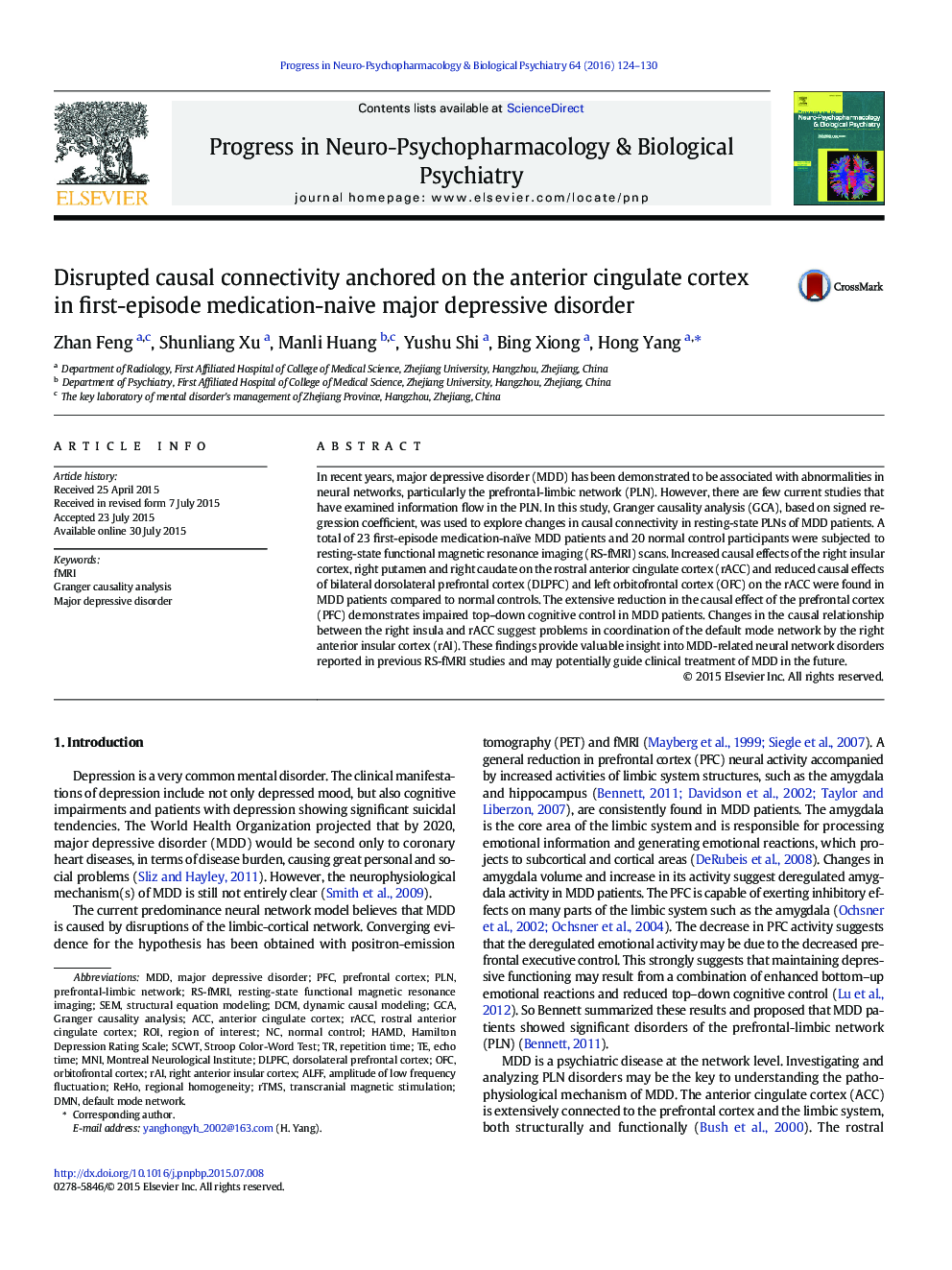| کد مقاله | کد نشریه | سال انتشار | مقاله انگلیسی | نسخه تمام متن |
|---|---|---|---|---|
| 5844272 | 1561030 | 2016 | 7 صفحه PDF | دانلود رایگان |
عنوان انگلیسی مقاله ISI
Disrupted causal connectivity anchored on the anterior cingulate cortex in first-episode medication-naive major depressive disorder
ترجمه فارسی عنوان
اختلال اتصال به علت در قشر قدامی در بخش اولیه اختلال افسردگی مهم
دانلود مقاله + سفارش ترجمه
دانلود مقاله ISI انگلیسی
رایگان برای ایرانیان
کلمات کلیدی
ALFFACCMNIDLPFCOFCDMNGCAMDDRAIrs-fMRIReHoPLNROIStroop Color-Word TestDCMPFCrTMSrACC - RACCMajor depressive disorder - اختلال افسردگی عمدهGranger causality analysis - تجزیه و تحلیل علیت گرنجرTranscranial magnetic stimulation - تحریک مغناطیسی مغزResting-state functional magnetic resonance imaging - تصویربرداری رزونانس مغناطیسی عملکرد حالت حالت استراحتfMRI - تصویرسازی تشدید مغناطیسی کارکردیAmplitude of low frequency fluctuation - دامنه نوسانات فرکانس پایینecho time - زمان اکوRepetition time - زمان تکرارdefault mode network - شبکه حالت پیش فرضprefrontal cortex - قشر prefrontalorbitofrontal cortex - قشر اوربیتوفرنتالanterior cingulate cortex - قشر سینگولیت قدامی، کورتکس سینگولیت قدامیRostral anterior cingulate cortex - قشر مفاصل قدامی رتورالdorsolateral prefrontal cortex - قشر پیشانی غدد درون رحمیdynamic causal modeling - مدل سازی عاملی پویاSEM - مدل معادلات ساختاری / میکروسکوپ الکترونی روبشیStructural equation modeling - مدلسازی معادلات ساختاریHamilton Depression Rating Scale - مقیاس رتبه بندی افسردگی همیلتونregion of interest - منطقه مورد نظرMontreal Neurological Institute - موسسه عصبی مونترالHAMD - همدنRegional homogeneity - همگنی منطقه ایNormal control - کنترل عادی
موضوعات مرتبط
علوم زیستی و بیوفناوری
علم عصب شناسی
روانپزشکی بیولوژیکی
چکیده انگلیسی
In recent years, major depressive disorder (MDD) has been demonstrated to be associated with abnormalities in neural networks, particularly the prefrontal-limbic network (PLN). However, there are few current studies that have examined information flow in the PLN. In this study, Granger causality analysis (GCA), based on signed regression coefficient, was used to explore changes in causal connectivity in resting-state PLNs of MDD patients. A total of 23 first-episode medication-naïve MDD patients and 20 normal control participants were subjected to resting-state functional magnetic resonance imaging (RS-fMRI) scans. Increased causal effects of the right insular cortex, right putamen and right caudate on the rostral anterior cingulate cortex (rACC) and reduced causal effects of bilateral dorsolateral prefrontal cortex (DLPFC) and left orbitofrontal cortex (OFC) on the rACC were found in MDD patients compared to normal controls. The extensive reduction in the causal effect of the prefrontal cortex (PFC) demonstrates impaired top-down cognitive control in MDD patients. Changes in the causal relationship between the right insula and rACC suggest problems in coordination of the default mode network by the right anterior insular cortex (rAI). These findings provide valuable insight into MDD-related neural network disorders reported in previous RS-fMRI studies and may potentially guide clinical treatment of MDD in the future.
ناشر
Database: Elsevier - ScienceDirect (ساینس دایرکت)
Journal: Progress in Neuro-Psychopharmacology and Biological Psychiatry - Volume 64, 4 January 2016, Pages 124-130
Journal: Progress in Neuro-Psychopharmacology and Biological Psychiatry - Volume 64, 4 January 2016, Pages 124-130
نویسندگان
Zhan Feng, Shunliang Xu, Manli Huang, Yushu Shi, Bing Xiong, Hong Yang,
